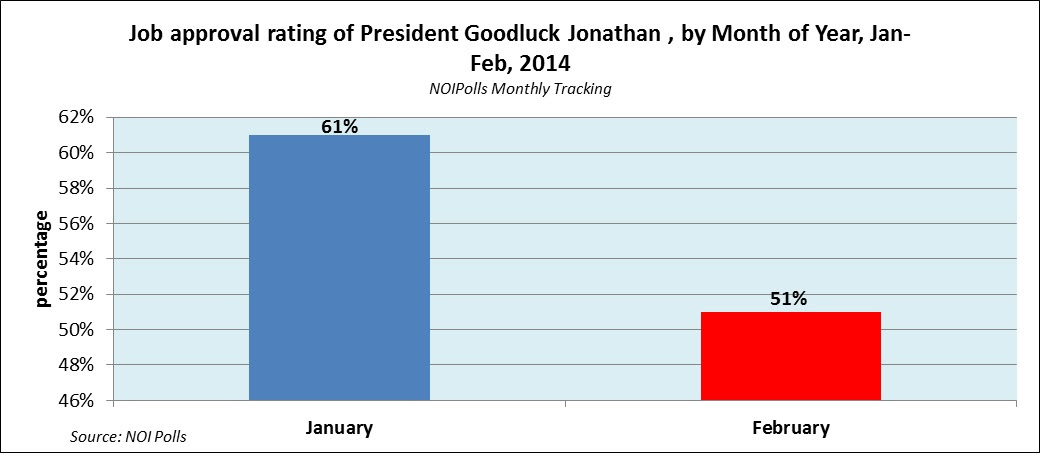These findings represent the February 2014 poll results of the monthly governance poll conducted by NOIPolls to gauge the opinions and perceptions of Nigerians regarding the approval rating of the President, the performance of the President on key elements of his transformation agenda, and the state of power supply in the country.
Respondents to the poll were asked three specific questions. The first sought to gauge the perception of Nigerians on the performance of President Goodluck Jonathan over the past 1 month. Respondents were asked: Do you approve or disapprove of the job performance of President Jonathan in the past 1 month? Findings reveal that 51% (35%+16%) of respondents approve of the President’s job performance, where 35% approve and 16%strongly approve. In addition, 27% of the respondents disapprove of the President’s job performance, representing a 10-point increase from January 2014 (17%). Similarly, 22%remain neutral as they neither approve nor disapprove.
An assessment of the President’s performance based on geo-political zone indicates that the South-East zone (84%) has the highest proportion of respondents that approve of the President’s job performance, followed by the South-South zone (63%). In addition, the South-West zone (37%) has the highest proportion of respondents that disapprove of his performance while the North-West (26%) zone accounted for the highest proportion of respondents that remained neutral on the president’s approval rating.
To assess the performance of the president on key areas of his transformation agenda, respondents were asked: On a scale of 1 to 5, where 1 is very poor and 5 is excellent, how would you rate the performance of President Jonathan in the following areas? (1) Job Creation (2) Power (3) Economy (4) Health (5) Education (6) Agriculture (7) Transportation (8) Foreign relations and (9) Security.
On the 5-point scale, the president had an average performance of 3 in Economy, Health, Agriculture & Food security, Transportation and Foreign policy & Diplomacy while on Job creation, Power, Education and Security, the president was ranked 1 which signifies a very poor performance.
A comparison of the current findings with January 2014 results reveal that the President’s performance rating on Job creation, Power and Education declined from 3 to 1 in February. Furthermore, his rating on security dropped from a good ranking of 4 to 1 in February; this drop may be attributed to the recent spate of attacks by the Boko Haram sect in some North Eastern States.
From the standpoint of geo-political zones, the North-East and the South-East zones with48% each, both accounted for the highest percentage of respondents that experienced an improvement in their power supply, while the North-West zone accounted for the highest number of respondents that said “there’s no difference at all” or “it remains bad” with 24% and34% respectively. Additionally, the South-South zone (20%) has the largest proportion of respondents that indicated “it’s very bad, had gone to worse”.
When these current findings are compared with the results obtained in January 2014, there was a 4-point decline in the proportion of respondents that experienced an improvement in the condition of power in February.
In conclusion, the results from the current poll have revealed that despite the 10-point decline,51% of adult Nigerians approve of the job performance of the president over the past month. More findings revealed that the President had an average performance ranking on Economy, Health, Agriculture & Food security, and Transportation; while he had a poor performance ranking on Security, Job creation, Power, and Education. Furthermore, the majority of Nigerians (40%) experienced slight improvements in the situation of power supply to their households over the past one month; however, this figure represents a 4-point drop in this group. Finally the decline in the approval rating of the President may be indicative of the noted decline in power supply in February, when compared to January; as well as the recent spate of attacks in North Eastern Nigeria, which may have negatively impacted his rating on security.
Survey Methods
The opinion poll was conducted in February 24th to 26th 2014. It involved telephone interviews of a random nationwide sample. 1,000 randomly selected phone-owning Nigerians aged 18 years and above, representing the six geopolitical zones in the country, were interviewed. With a sample of this size, we can say with 95% confidence that the results obtained are statistically precise – within a range of plus or minus 3%. NOIPolls Limited, No. 1 for country-specific polling services in West Africa, which works in technical partnership with the Gallup Organisation (USA), to conduct periodic opinion polls and studies on various socio-economic and political issues in Nigeria. More information is available at www.noi-polls.com
Disclaimer
This press release has been produced by NOIPolls Limited to provide information on all issues which form the subject matter of the document. Kindly note that while we are willing to share results from our polls with the general public, we only request that NOIPolls be acknowledged as author whenever and wherever our poll results are used, cited or published.
NOIPolls hereby certifies that all the views expressed in this document accurately reflect its views of respondents surveyed for the poll, and background information is based on information from various sources that it believes are reliable; however, no representation is made that it is accurate or complete. Whilst reasonable care has been taken in preparing this document, no responsibility or liability is accepted for errors or fact or for any views expressed herein by NOIPolls for actions taken as a result of information provided in this report. Any ratings, forecasts, estimates, opinions or views herein constitute a judgment as at the date of this document. If the date of this document is not current, the views and content may not reflect NOIPolls’ current findings and/or thinking.







